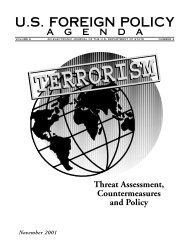Working for Women Worldwide - Embassy of the United States
Working for Women Worldwide - Embassy of the United States
Working for Women Worldwide - Embassy of the United States
You also want an ePaper? Increase the reach of your titles
YUMPU automatically turns print PDFs into web optimized ePapers that Google loves.
president’s 2004 budget <strong>for</strong> <strong>the</strong> Centers <strong>for</strong> Disease<br />
Control and Prevention (CDC) and <strong>the</strong> National<br />
Institutes <strong>of</strong> Health (NIH) provides over $382 million<br />
<strong>for</strong> cardiovascular and pulmonary disease research and<br />
prevention activities related to women. It also includes<br />
$12 million <strong>for</strong> <strong>the</strong> centers’ WISEWOMAN program,<br />
which <strong>of</strong>fers screenings <strong>for</strong> high blood pressure<br />
and cholesterol, and o<strong>the</strong>r health interventions to help<br />
prevent cardiovascular and o<strong>the</strong>r chronic diseases in<br />
women.<br />
Estimates are that in 2004 more than 200,000<br />
American women were diagnosed with breast cancer.<br />
Regular screening <strong>for</strong> breast cancer continues to be <strong>the</strong><br />
most effective way to detect this disease early and to<br />
save lives, and mammograms are <strong>the</strong> best screening<br />
tool available.<br />
Recognizing this, <strong>the</strong> NIH invested about $700<br />
million in 2004 <strong>for</strong> breast cancer research; it will spend<br />
more than that in 2005. The CDC devoted over $200<br />
million in 2004, with plans to spend more in 2005, on<br />
an early detection program that promotes mammograms<br />
and helps low-income women af<strong>for</strong>d screenings<br />
<strong>for</strong> breast and cervical cancer. The Department <strong>of</strong><br />
Defense invested approximately $150 million <strong>for</strong> its<br />
breast cancer research program in 2004. All <strong>of</strong> this<br />
funding will help lead to better treatments and new<br />
hope <strong>for</strong> many Americans and <strong>the</strong>ir families.<br />
The administration, in <strong>the</strong> words <strong>of</strong> Secretary<br />
Thompson, is “working hard to create a future where<br />
women and men are free <strong>of</strong> <strong>the</strong> fear <strong>of</strong> breast cancer. ...<br />
My department is also working to improve <strong>the</strong> overall<br />
health <strong>of</strong> women by conducting research in cervical<br />
cancer, osteoporosis, obesity, diabetes, and every o<strong>the</strong>r<br />
major health issue. We’re also leading <strong>the</strong> Heart Truth<br />
Campaign. This campaign is designed to increase<br />
women’s awareness about heart disease, <strong>the</strong> numberone<br />
killer <strong>of</strong> women, and encourage women to take<br />
<strong>the</strong>ir heart health seriously. These, along with our<br />
ef<strong>for</strong>ts to fight breast cancer, are all great steps my<br />
department is taking to improve <strong>the</strong> quality <strong>of</strong> all<br />
women’s health.”<br />
To lower costs and increase accessibility to health<br />
care <strong>for</strong> <strong>the</strong> elderly and disabled, <strong>the</strong> Bush administration<br />
has provided a new prescription drug benefit<br />
under <strong>the</strong> nation’s Medicare program. In addition to<br />
prescription drug coverage, <strong>the</strong> program <strong>of</strong>fers all senior<br />
citizens, a majority <strong>of</strong> whom are women, <strong>the</strong> opportunity<br />
to benefit from Medicare drug-discount cards;<br />
poorer Americans, <strong>for</strong> example, can receive an extra<br />
$600 to help pay <strong>the</strong> cost <strong>of</strong> <strong>the</strong>ir medicines. President<br />
Bush championed this program to give older<br />
Americans “better choices and more control over <strong>the</strong>ir<br />
health care ... more access to comprehensive exams,<br />
disease screenings, and o<strong>the</strong>r preventive care, so that<br />
seniors across this land can live better and healthier<br />
lives.”<br />
The administration also has established new taxfree<br />
health savings accounts <strong>for</strong> individuals and groups<br />
to help <strong>the</strong>m plan and save <strong>for</strong> unexpected health<br />
expenses. It also has proposed <strong>the</strong> establishment <strong>of</strong><br />
association health plans to allow small businesses to<br />
band toge<strong>the</strong>r to negotiate more favorable health<br />
insurance rates and coverage. This would especially<br />
benefit <strong>the</strong> large number <strong>of</strong> women-owned small businesses<br />
sprouting up across <strong>the</strong> country.<br />
As with its international initiatives to fight <strong>the</strong><br />
scourge <strong>of</strong> HIV/AIDS, <strong>the</strong> U.S. government through<br />
<strong>the</strong> Department <strong>of</strong> Health and Human Services has<br />
established eight research objectives <strong>for</strong> <strong>the</strong> prevention,<br />
treatment, and understanding <strong>of</strong> HIV/AIDS in girls<br />
and women. The department also conducts a Safe<br />
Mo<strong>the</strong>r Initiative, a program that collects data and<br />
conducts research on how to improve maternal health.<br />
Moreover, <strong>the</strong> Bush administration has secured record<br />
funding levels <strong>of</strong> $4.6 billion <strong>for</strong> <strong>the</strong> <strong>Women</strong>, Infants,<br />
and Children (WIC) nutrition program <strong>for</strong> lowincome<br />
mo<strong>the</strong>rs and <strong>the</strong>ir young children.<br />
The Bush administration recognizes, however,<br />
that good health <strong>for</strong> women, and <strong>for</strong> all Americans,<br />
demands personal responsibility as much as government<br />
attention. The Healthier U.S. Initiative utilizes<br />
<strong>the</strong> expertise <strong>of</strong> federal agencies to in<strong>for</strong>m Americans<br />
<strong>of</strong> small steps <strong>the</strong>y can take to achieve greater fitness.<br />
Simple steps taken to engage in regular physical activity,<br />
eat a more healthful diet, get preventive screenings,<br />
and avoid risky behaviors can greatly reduce <strong>the</strong> risk<br />
and burden <strong>of</strong> <strong>the</strong> chronic diseases and conditions that<br />
affect many Americans.<br />
Economic Opportunity<br />
<strong>Women</strong> are making a significant contribution to<br />
<strong>the</strong> health and well-being <strong>of</strong> Americans today.<br />
Secretary <strong>of</strong> Labor Elaine Chao explains why: “Many<br />
women today work in <strong>the</strong> home, raising <strong>the</strong> families<br />
who are <strong>the</strong> future <strong>of</strong> our country. <strong>Women</strong> today comprise<br />
more than half <strong>of</strong> all workers in management,<br />
pr<strong>of</strong>essional, and related occupations in <strong>the</strong> <strong>United</strong><br />
<strong>States</strong>. And women are at <strong>the</strong> <strong>for</strong>efront <strong>of</strong> entrepreneurship,<br />
creating millions <strong>of</strong> new jobs and building<br />
60












